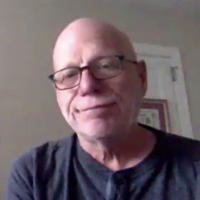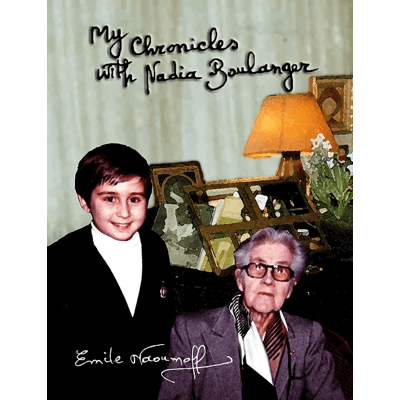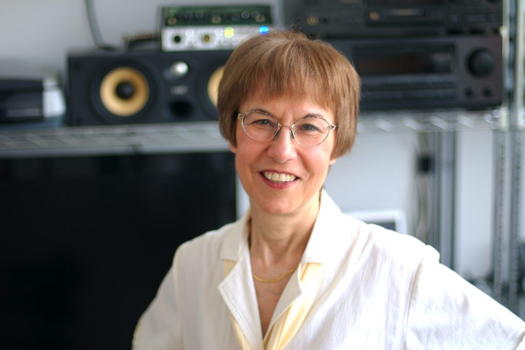- Robert Auger
- Mozart: The Marriage of Figaro
- harpist
- Eugenia Papadimas
- Mike Wheeler
- Jacques Barzun
- Israel Baker
- Academy Choir Wimbledon
 VIDEO INTERVIEW: Ona Jarmalavičiūtė talks to American choral conductor Donald Nally, director of The Crossing, in this fascinating, illustrated, one hour programme.
VIDEO INTERVIEW: Ona Jarmalavičiūtė talks to American choral conductor Donald Nally, director of The Crossing, in this fascinating, illustrated, one hour programme.
 PODCAST: Join Jenna Orkin, Maria Nockin, John Daleiden, Gerald Fenech, Julian Jacobson, Patrick Maxwell, Giuseppe Pennisi and Mike Wheeler for a fascinating fifty-minute audio only programme.
PODCAST: Join Jenna Orkin, Maria Nockin, John Daleiden, Gerald Fenech, Julian Jacobson, Patrick Maxwell, Giuseppe Pennisi and Mike Wheeler for a fascinating fifty-minute audio only programme.
Stream of Consciousness

ONA JARMALAVIČIŪTĖ talks to
Canadian oboist and composer Elizabeth Raum
Canadian oboist and composer Elizabeth Raum (born 1945) has a career in music that spanns over forty-five years. She had worked as principal oboe with the Atlantic Symphony Orchestra and Regina Symphony Orchestra, but her main career path unfolded with composing music. As one of the most eminent Canadian composers of today, Raum has commissions coming from such performing groups as the Royal Winnipeg Ballet, St Lawrence String Quartet, Symphony Nova Scotia and the Calgary Philharmonic. Her music is played all over the world in concerts and festivals throughout Canada, the US, Europe and Asia. Writing for varied media and in remarkably diverse styles, her creative heritage includes four operas, over eighty chamber pieces, eighteen vocal works, choral works including an oratorio, several ballets, concerti and major orchestral works. Her biggest awards include the Commemorative Medal for the Centennial of Saskatchewan, the Saskatchewan Order of Merit, and an Honorary Doctorate in Humane Letters from Mount Saint Vincent University in Halifax, Nova Scotia. In my conversation with Elizabeth Raum, themes of creativity as a process are presented. Raum breaks down her daily creative routine and shares thoughts about the meaning of her work.

Elizabeth Raum
Ona Jarmalavičiūtė: What are your thoughts about the structuring of the creative process?
Elizabeth Raum: When I start writing, I'm not really sure what I do. I think I visualize the performer (I always write better for someone I know, and I usually ask for a tape of that person's playing). If the piece is for orchestra, I write the notes imagining the sounds of the instruments, although the manuscript is more as if I were writing for the piano. I often write on a small score of around 4 staves rather than the full sized score for the first draft. But I like to be able to play most of it on the piano to some extent, although I'm not a very good pianist. I do need to hear the progressions aloud. I can't really do it in my head (unless the piece is quite simple).
I think you could call my system 'stream of consciousness' writing. In other words, I just keep writing one note after another for the first draft and often, I'm not even sure if it goes together nicely. The next day when I play it back, it becomes clear, and I can change what doesn't fit, or I get ideas about where I seemed to be trying to go the day before. So much of it is the subconscious transferring itself to the conscious while eliminating whatever doesn't work, and developing things that seem to have someplace special to go. While I'm doing all of this, I'm thinking in terms of instruments, and I'll write down the instrument or combination I'm 'hearing' as I write. Keep in mind that I've played in orchestras for around forty years with the brass behind me, the woodwinds around me, and the strings in front of me, so I have an innate feel for what an orchestra sounds like. (I play oboe.) I also am able to check with my friends who play the other instruments what is comfortable for their instruments or how I can rewrite things to make them comfortable.
Now that I work with the computer, I find it's streamlined my writing considerably. I still write as described above, but now if I feel there has to be some measures inserted, I don't have to physically cut and paste them as I used to. I do it on my Finale program. Also, I can hear the music played back by the computer, so it's easier to stand back and listen to what I've written. And I can put the notes right into the score and then extract parts so that's quicker, too. I think the best thing about the computer is that it's enabled me to write much more than I used to be able to write. Before, the very task of writing all those notes with a pencil, then writing them again to the final version, then inking in the notes, and finally copying parts took four times as long as working with the computer, and I've reached the point where I know the program so well that I don't have to think about the physical process of putting in the notes. It can go right from my mind to the screen!
When the piece is finished, I have to get it ready for publication which I do myself now that there are notation programs. I used to have a copyist but often he got paid more to write out the parts than I did to write the piece! Now with the notation programs, it's much easier. Regarding publication, I have two main publishers I send my music to for brass works but a lot of my music goes to the Canadian Music Centre which acts as a distribution centre. They take care of distribution and I receive a percent of the sales.
OJ: What are your thoughts about this quote: 'Works of art have been compared to icebergs: what is visible is but a small part of the whole. An artwork might seem to exist in splendid isolation, but that impression is misleading. Cultural products inevitably arise from a context, a submerged landscape that is often not easily accessible'?
ER: I agree with that quote. Another analogy is a comparison of a musical work to a house where the structure, plumbing, wiring, are hidden, neatly covered by the outside 'skin' so to speak. What we see is the finished product, the decoration, while what makes the house work is under the surface. Music is much the same with the composer (architect and builder) having to have knowledge of music theory, harmony, melody, rhythm, and orchestration.
The peak would be the music that is played by the musician and heard by the audience. Underneath is all the work that goes into that music including the concept, the writing, and the copying.
OJ: Are you familiar with J Campbell's concept of 'hero's journey'? Could you draw a parallel between creative process and such structuring of a story?
ER: This would be a good subject for a doctoral thesis and would take much more time to discuss properly than I'm willing to spend at this time. In fact, the concept of a 'hero's journey' was probably the inspiration for Strauss's Ein Heldenleben.
OJ: Do you have certain patterns, structures when it comes to your creative process?
ER: Although I tend to write in a form, whether it be one of the standard forms (e.g. theme and variations, song forms, rondo, sonata allegro, contrapuntal) I also like to write through-composed music, making it up as I go along, so to speak. Having said that, I always write thematically. For me, music must have cohesion. It can't be scattered, mindless notes, as is often the case with contemporary music that makes little sense but needs to be 'explained' through program notes. I think of this as lazy music: just write notes and assume the performers will somehow make it work you give them enough imagery.
OJ: What is the most fun and the most boring part in the compositional process?
ER: For me, the best part is the actual writing. The time seems to fly by when I'm working on a piece. I can't really say any of the creation of a piece is boring but the most tedious part is putting in the musical instructions, like dynamics, phrasing, tempos. Those things are extremely important but until you either play the piece or hear it being played, you're never sure if your choices are correct. I recently heard a lecture by Gene Pokorny, the tuba player of the Chicago Symphony, who talked about how the performer often completely changes the musical instructions given because of his personal interpretation and he used Pavarotti's recording of a Puccini opera as an example of how an opera singer embellishes his performance in his own way. I like it when someone performs my music in that personal way.
OJ: Define inspiration – does it exist?
ER: Sometimes after working away at a piece and not seeming to be getting anywhere, suddenly it's like all the effort breaks through with an inspiration and I know where I'm going. I always know that I'll achieve that breakthrough if I keep going.
OJ: How do you usually create a new idea of a piece?
ER: It's hard to say specifically how I start the creation as I seem to get into it as I start working. Trying to describe it is like trying to describe a dream. But generally, I use the piano and write sketches, play them and correct them over a period of time, working measure by measure. Also, I've found I can work with the computer and the keyboard as well, although I always must go over everything carefully on the piano. I seem to feel what is good and bad through my fingers although I'm only an amateur pianist. I can't do this with an electronic piano. Somehow I don't feel the vibrations the same way. I seem to have an innate sense of form and a good taste filter (a term my daughter once used and I thought was quite accurate). So I can tell what isn't going to work and what to do to fix it.
OJ: What form do your notes and sketches take?
ER: I would say I start things with a sketch, sort of like priming the pump, but then I go into the piece and move ahead from there. My notes and sketches look like really sloppy manuscript with pencil and paper. That's how I get started. The next day when I go back to it, I can tell if it's good or bad. I have a very good taste filter!
OJ: What do you do to get into your creative zone?
ER: I have to be alone in the house and there has to be quiet. Composing is extremely private. I've heard artists say the same thing. I don't think I could possibly compose with someone listening.
OJ: When do you decide that the preparation (precomposition) period is over and now you will start to actually compose?
ER: This depends on the piece. I wrote a piece called Requiem for Wounded Knee about the massacre of the natives at Wounded Knee. It was commissioned by Don Harry, the tuba teacher at the Eastman School of Music for two tubas, narrator, and piano. Don is American Native and wanted something on Natives. I spent around a month researching their music and the event. I went to Pow Wows (I lived in Saskatchewan at the time which has a large Native population). I finally felt I was immersed enough in the culture and the subject that I could start writing. It's similar when I write an opera although this starts with the libretto which I usually write myself.
OJ: Could you describe your state of mind when you are creating something?
ER: This is something I find hard to do because when I stop composing, I am no longer in that state of mind. In fact, I usually can't remember what I've written until I get back to it.
OJ: Do you critique your own work?
ER: Yes, I do. Sometimes I'll change something after I've heard it performed. The performance makes such a difference. Unfortunately, if you hear a piece poorly performed, you're apt to think it needs rewriting, but then you hear a good performance and you decide it works as is. Generally, I don't finish a work until I like it.
OJ: Do you identify with your music?
ER: I think I identified more with my music when I was much younger. Now sometimes I forget I wrote the piece and I listen to it as music, not one of my compositions. In fact, often I'll hear something that I wrote and think it sounds really familiar, and then realize it's mine! Fortunately, every time that's happened, I've liked the piece.
OJ: Thank you for the conversation!
Copyright © 3 November 2019
Ona Jarmalavičiūtė,
Vilnius, Lithuania

FURTHER INFORMATION ABOUT ELIZABETH RAUM
FURTHER INFORMATION ABOUT CANADIAN MUSIC AND MUSIC IN CANADA


